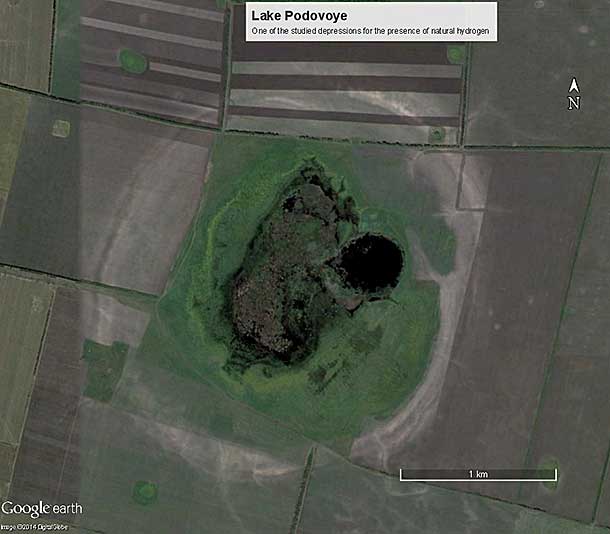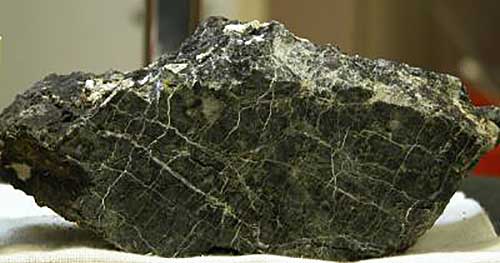
In 2009, I talked about how naturally occurring hydrogen is being leaked from the earth’s crust in Russia (see image at top), Europe and a few other places. I posited that one day this free hydrogen gas could one day be used to fuel cars.
In 2011, I asked the rhetorical question of whether or not natural underground hydrogen streams could also be used as fuel.
Now, less than a week ago, Duke University researchers have theorized that there are vast amounts of hydrogen gas underneath the ocean floors (see serpentinized rock specimen below).
According to Stacey L. Worman, “Our model, however, predicts that large quantities of H2 may also be forming within faster-spreading tectonic plates – regions that collectively underlie roughly half of the Mid-Ocean Ridge.”
This begs the question of whether or not this naturally occurring hydrogen gas is a renewable resource or not? Could it be that natural hydrogen is like petroleum trapped beneath the earth’s surface as a finite resource? Or could it be that due to a natural process, yet to be discovered, that free hydrogen is being continually created inside of the earth’s crust and is under pressure to come to the surface?

This also begs the question of whether or not we can drill or capture this clean energy carrier in nature and then use it for fuel cells (and other uses).
Since the discovery of pure hydrogen occurring naturally inside of the earth is very new, there are more questions than answers.
Perhaps the most prophetic answer comes from Professor Friedemann Freund from the NASA Ames Research Centre, in California, when he stated back in 2002, “In the top 20km of the Earth’s crust, the conditions are right to produce a nearly inexhaustible supply of hydrogen.”
My hope is that one day soon this passage about Hydrogen Fuel on Wikipedia will need to be changed, “Because pure hydrogen does not occur naturally on Earth in large quantities, it takes a substantial amount of energy in its industrial production.” This factual change will apply to textbooks, journals, websites and other media as well.
Update: Many thanks to @NH2E for alerting me to the 1st hydrogen producing well in the world in Mali, Africa http://nh2e.com/news/38-first-h2-well and http://africa-me.com/hydrogen-power-in-mali/ – excellent!
References
https://nicholas.duke.edu/about/news/oceans-may-be-large-overlooked-source-hydrogen-gas
https://en.wikipedia.org/wiki/Hydrogen_fuel
https://www.facebook.com/Hydridic-Earth-the-source-of-Natural-Hydrogen-163793253641793/
https://twitter.com/hydridic_earth
https://www.linkedin.com/groups/1951338/profile
http://www.academia.edu/25747876/Natural_Molecular_Hydrogen_Seepage_Associated_with_Surficial_Rounded_Depressions_on_the_European_Craton_in_Russia